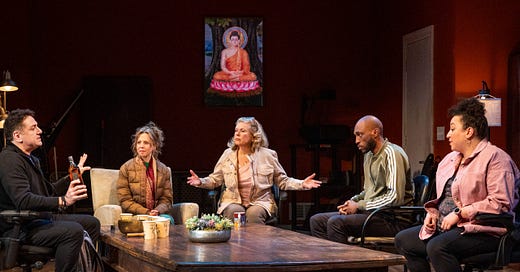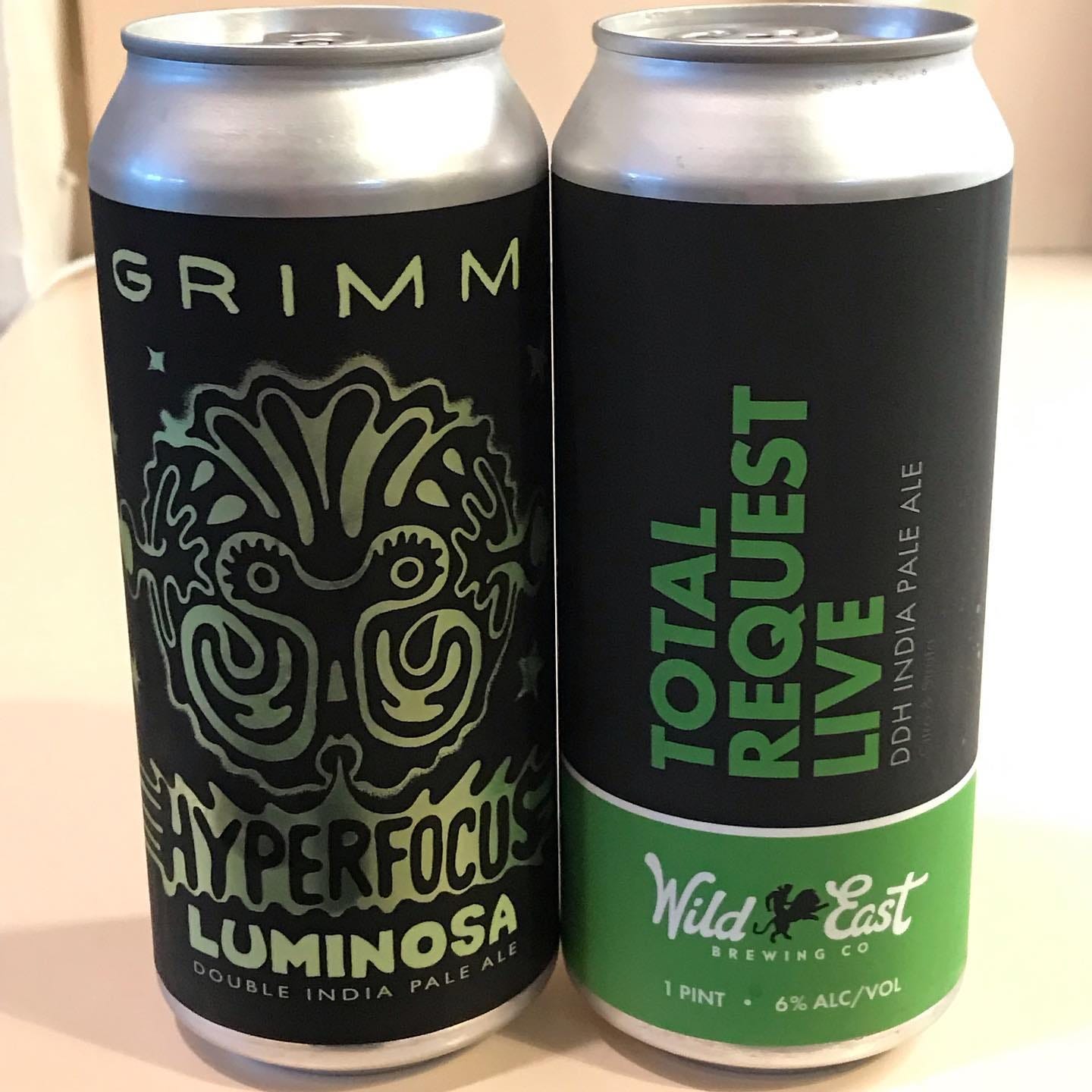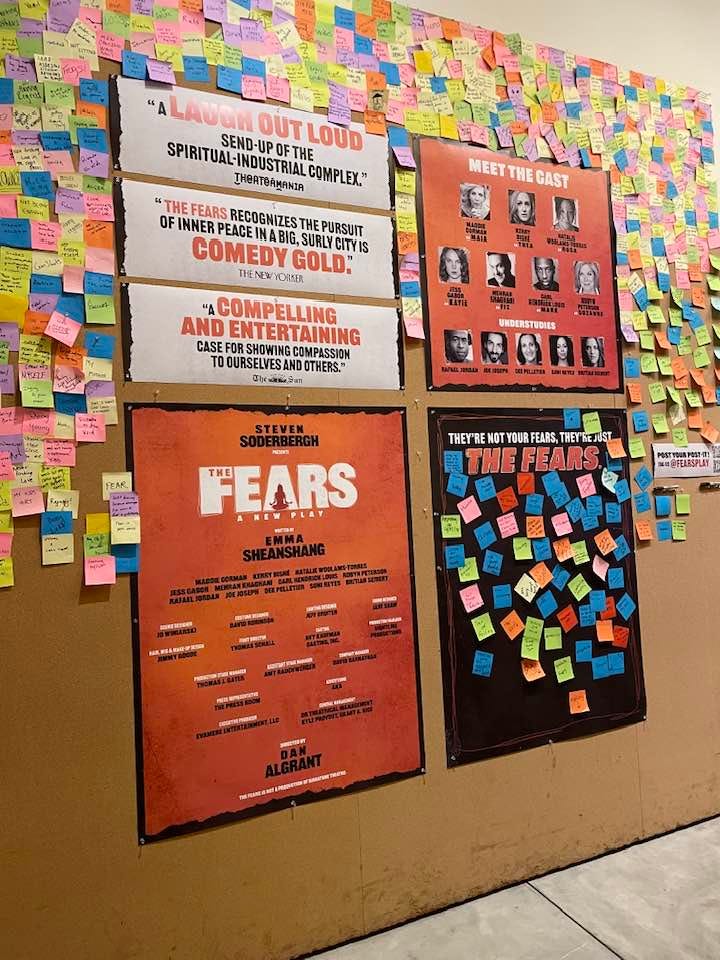A group uses Buddhism and meditation to deal with childhood trauma in The Fears (photo © Daniel Rader)
“Let’s do the Fears,” Maia (Maddie Corman) says in Emma Sheanshang’s new satire, The Fears. “We take a piece of paper and a pencil . . . and write any fears . . . not the big one.”
The big one — I’m assuming it’s death, although each character has a trigger word for their particular fear — was not on my list until a few weeks ago, when I started the next decade of my existence. Now I can’t seem to get the end out of my mind; age is no longer just a number to me, even as Taeko, our dear, dear Norwegian Forest / Maine Coon mix, is dying. We’re likely to have to put her down any day now; she will be the fourth cat of ours to die at thirteen. (Thankfully, we currently also have two older cats.)
I was both shocked and overjoyed by the many coincidences in The Fears that relate to my life, which might be why I enjoyed it much more than my colleagues; the reviews were not overly favorable, perhaps explaining why the Irene Diamond Stage at the Pershing Square Signature Center was more than half empty the night I went. However, such relevance can also be a testament to fine writing, as the audience was rapt that evening and delivered a well-deserved standing ovation.
The world premiere of The Fears continues through June 18; it’s executive produced by Steven Soderbergh, which helped bring in an all-star list of fans on opening night, including Debra Messing, Steve Buscemi, B. D. Wong, Crystal Lucas-Perry, and Tea Leoni and Tim Daly.
Taeko is determined to make the most out of every minute of life, offering love and solace even as she faces the end (video by twi-ny/mdr)
The intermissionless ninety-minute play is set at a weekly meeting of a Buddhist trauma group, where Maia (Maddie Corman), Thea (Kerry Bishé), Rosa (Natalie Woolams-Torres), Katie (Jess Gabor), Fiz (Mehran Khaghani), Mark (Carl Hendrick Louis), and Suzanne (Robyn Peterson) gather to meditate and discuss how they are dealing with horrific childhood wounds, without mentioning specifically what they are. Maia runs the meeting, Fiz is a boisterous gay man with no filter, Suzanne is protective of the rules, Rosa is having family issues, Katie is a young woman who has apparently joined a cult, Mark has no sense of humor, and Thea is a first-timer who initially hides that she is Mark’s partner, as couples’ participation is taboo.
It made me think of how I’m meditation adjacent. My wife, Ellen, has been meditating for twenty-five years and is currently on the board of Dharma House NYC, a multi-lineage Tibetan Buddhist dharma center in Queens under the direction of Chokyi Nyima Rinpoche, the abbot of KaNying Shedrub Ling monastery in Boudananth, Kathmandu, Nepal, and the founder of Rangjung Yeshe Institute. My wife travels around the world to study with Rinpoche as well as his nephew, Kyabgön Phakchok Rinpoche, from Garrison and Cooperstown in New York to Austria, Denmark, France, India, and Nepal. I have accompanied her to many of those places, most notably Kathmandu twice; although I don’t meditate, I sit in on the teachings and have even taken refuge with Chokyi Nyima Rinpoche. I always get a kick out of how Tibetan Buddhist chanting sounds similar to Jewish davening in Yiddish.
In February, Ellen went to Boudha for the cremation of Kyabjé Tsikey Chokling Rinpoche, the father of Phakchok Rinpoche and the brother of Chokyi Nyima Rinpoche; Chokling Rinpoche had died in December 2020 at the age of sixty-eight and his remains, or kudung, were being cremated in a massive event attended by thousands of Buddhists. I watched much of the livestream of the ceremony, which was not dour or sad at all. Back in the ’80s, I wanted to have a Viking funeral like film producer Felix Farmer (Richard Mulligan) has in Blake Edwards’s S.O.B., but now I think I’d prefer what Chokling Rinpoche had.
I began writing this article on Sunday, when I usually post my Substack essays, but I just couldn’t find the words. I don’t think it was a case of the Sunday Scaries, a term I’m only now learning about. Every Sunday night, a longtime friend of mine posts on Facebook a photo of a pair of different craft brews he’s enjoying before having to go back to work Monday morning; he calls them Sunday Scaries beers. Among his favorite brands are Grimm and Inspire Hope.
Another friend of mine, Kimberly Brown, writes every other week about the Sunday Scaries through her Meditation with Heart website. Brown is open about her difficult childhood as an adoptee with alcoholic parents and how Buddhism can provide comfort and guidance. Author of the books Navigating Grief and Loss and Steady, Calm, and Brave, Brown says about her “Welcome Scaries” column, “My dear friends, so many of us experience dreadful foreboding, creeping malaise, and/or just a little bit of nervousness on Sunday nights, in anticipation of the coming work and school week and all we have to do. That’s why I’ve decided to offer a ‘Welcome Scaries’ newsletter on the second Sunday of each month. My intention is to help us bring kindness to our Scaries, instead of fighting with them, resenting them, or trying to get rid of them.”
Brown was previously the executive director of the Interdependence Project (IDP), a nonprofit meditation and activism organization where my wife served on the board and which was my introduction to Buddhist philosophy.
I’d never had even a touch of the Sunday Scaries before being overtaken by these recent fears of the Big One. No one wants the weekend to end, but we ourselves don’t really want to end, either.
The number of coincidences between my life and the goings-on in The Fears is a measure of the play’s thoughtfulness and honesty, even as it devolves into mayhem. At one point, the characters argue over the correct pronunciation of “Buddhist,” whether the “u” is hard or soft; Ethan Nichtern, the founder of the IDP, pronounced it soft, which was the first time I’d ever heard it said that way. Fiz makes a joke about it, reciting the tongue twister “Betty Botter bought a bit of butter,” which my mother taught me when I was a kid and still spills out of my mouth often. (“Betty Boughta bought a bit of butter. ‘But,’ she said, ‘my butter’s bitter. If I put it in my batter, it will make my batter bitter. But a bit of better butter will make my bitter batter better.’”)
Nichtern was a teacher in residence at Shambhala Meditation Center of New York when a scandal with Sakyong Mipham Rinpoche brought it down; Sheanshang incorporates a fictionalized version of those events in her play. (Nichtern wrote about the awful situation here.)
Some people fight the Sunday Scaries with craft beer (photo by Joe Romano)
Another coincidence involves where everyone sits. At each meeting, the members of the group take whatever seat they want, from a comfy armchair to a taped-up rolling chair and couches, not caring, except for Fiz. It bothered me that they did not sit in the same spot every time, reminding me of how my day job has transitioned to hoteling, where employees have no designated space unless they come in at least three times a week. (The younger workers don’t have as much of an issue with this randomness as the older staff. Oh, and my work chair at home has one arm heavily taped.)
So I was thrilled when Fiz makes a big deal about Suzanne suddenly usurping his seat. Suzanne, who is white, is arguing with Mark, who is Black, about bullying. Fiz cuts in, saying, “You took my chair, Suzanne. And you’re calling us bullies? Do you know how that feels? The disrespect? Of having you come and plop your white privileged ass on my chair. . . . I may not own it — I may not have some deed, but that is my soft little feathered place on this barbed-wire minefield of a planet.” That all made perfect sense to me.
I’ve also playfully referred to Buddhist organizations as cults, which of course they’re not, but it took a while for my wife to think that’s funny. So I couldn’t help but laugh when Katie joins an outside group that Fiz explains is a cult. “It’s no different from this,” Katie says defensively.
People are invited to add their own fears to the wall at the Pershing Square Signature Center (photo by twi-ny/mdr)
At one point, Rosa describes the exercise known as Tonglen to Thea, explaining, “We take in someone else’s suffering and give them compassion.” A few weeks ago I visited Dr. Jampa Yonten of the Tibetan Art and Healing Center, and he suggested I start practicing Tonglen, which was previously recommended to me by Chokyi Nyima Rinpoche; maybe the world is telling me something.
Adroitly directed by Dan Algrant, who primarily works in film and television, The Fears is reminiscent of Bess Wohl’s marvelous Small Mouth Sounds, which is set at a silent retreat and also deals with such topics as impermanence and interdependence. Ellen has been on several silent retreats; I have not joined her for any of those, as I can’t imagine myself being able to shut up for more than even a few hours at a time.
But as I get older — a phrase that I wouldn’t have used up until recently — I find myself more and more concerned with impermanence and interdependence. As Mark (another coincidence?) says in the play, something I have heard countless times from Buddhist teachers and my wife, “May all sentient beings be free from suffering.”
No matter what their fears.






I believe that one of the greatest lines of all time is from Franklin Delano Roosevelt during his first innaugaral address: "We have nothing to fear, but fear itself.", and I have often had to quote it to people in recent years to calm them down (pandemic, civil unrest, political unrest). To let your life be ruled by fear (or, for that matter, money or material things) is not living - it is putting yourself in a state of perpetual self-torture - your are allowing theoretical external circumstances to control you, instead of you controlling them. I have learned only recently that controlling how we react to circumstances when they arise is the best way of dealing with things - let me make clear that I often fail in this endeavor, but I am trying, and trying is the human way. We are human, we are fallable, we make mistakes, circumstances arise out of our control, but we try to deal with them and deal with them the best we can when they come up. Another thing: overreaction doesn't solve anything - it just pisses everybody off in your near vicinity!!!
I don't meditate, but a lot of people do, and from sharing their experiences, it seems to be quite helpful to them. I'm too lazy to participate, but we all do our own form of meditation in our own way - maybe mine is putting down the phone, shutting off the tv, and just reading - it definitely helps dealing with stress, especially with a cup of good tea!!!
Mark, honestly, at this point in our lives, we have nothing to fear. We've all been through the mill at this point, dealt with tons of shit,, and really, there is nothing they can throw at us that none of us can't handle. Just enjoy your life and all of your blessings!!! Woody Allen has been fearing his death for the 70 years, which means he has literally tortured himself up to his current age of 87!!! What a waste of energy!!!
A Buddhist friend told me about this play recently, so glad to read your experience of it. I just want to say that there are so very many different types of Buddhism that I hope people who see or hear about "The Fears" recognize that it's not representative of all of its schools or traditions.